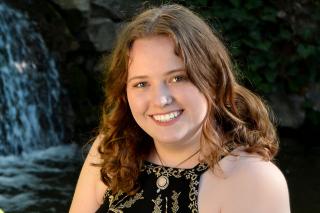Annabelle Hannah ’25, a double-major in Chemistry and Physics, was accepted into the 2024 summer Research Experience for Undergraduates (REU) program at the University of Pennsylvania (UPenn). The 10-week program, which provides housing and a stipend to accepted students, is funded by the U.S. National Science Foundation (NSF).
“I’m assigned to a research lab, where I’ll test a few projects to find what resonates with me,” says Hannah, who was assigned to the inorganic chemistry lab at UPenn, a subject she intends to pursue beyond her bachelor’s degree. While organic chemistry works only a few elements on the periodic table — namely carbon, hydrogen, oxygen, and nitrogen — inorganic chemistry focuses on the rest of the periodic table, including metals.
Hannah had initially considered medical school before green chemistry piqued her interest. “I see this as a way to help on a bigger scale,” she says. “Green chemistry uses research to create more sustainable forms of energy while reducing carbon dioxide in the air.”
Hannah attended the American Chemical Society Conference in March of this year to present her ongoing research at Simmons: synthesizing nanoparticles for carbon dioxide reduction reactions. “[At the Conference] I saw the work that graduate students are doing in the inorganic chemistry lab at UPenn,” she recalls. “There was a lot of overlap between inorganic and green chemistry, and that’s something I’m passionate about.” For this reason, she chose UPenn over the handful of REU acceptance letters she received.
Assistant Professor Joe Elias was delighted to hear about Hannah’s placement in UPenn’s REU Program. “Annabelle is extraordinarily talented in the classroom and in the research laboratory, and I am excited to see her come into her own as an independent researcher,” says Elias. He notes that Hannah will work with Chemistry Professor Thomas Mallouk at UPenn, who is, “a pre-eminent figure in the world of solid-state inorganic chemistry. I'm looking forward to hearing how she likes working in his lab.” Elias foresees common threads connecting Hannah’s current research at Simmons University’s Electrochemical Nanomaterials Lab. “I am certain Annabelle will gain greater insight into her studies through this REU program.”
Road to a Double Major
“Coming to Simmons my freshman year, I was planning to be a Biology major and was considering medical school,” Hannah recalls. Taking her pre-med requirements — General Biology and Chemistry — inspired a shift. “There was something about Chemistry that resonated with me. I enjoyed the way math was integrated into it, and the analytical thinking that it involved.”
As a Chemistry major, she was doing more work in the labs, and eventually leaned away from her medical school plans, toward research. “My sophomore year, I was taking Physics as part of my Chemistry requirement. [Associate Professor of Practice] Michael Jordan encouraged me to pick up Physics as a second major, and I’m so glad that I did! Majoring in Physics has helped me with chemistry courses. I feel more confident with that physics background.” Hannah has been a Teaching Assistant for Physics, and a member of the Physics lab setup team.
Undergraduate Research at Simmons
Hannah encourages new Simmons students to look into the research labs at Simmons, if they have even the smallest inclination toward research.
“The professors are super friendly! Send them an email and meet them in their offices. Learn more about the projects they have going on,” says Hannah. “They’ll tell you if they have positions open in their lab. Check out the lab and see if it’s a good fit for you. There is exciting research happening at Simmons!”
There are exciting off-campus opportunities as well, through REU. “It’s a great way to get research experience and meet students off campus,” says Hannah. “I’ve already met students from other universities who are also interested in research and science.”
In addition to the chemistry lab, Hannah works in the Biomedical Ultrasound Lab with Professor Jason White, Director of the 3+2 Engineering Program at Simmons. She’s working on the Transcranial Ultrasound Device for Guiding Emergent Neurosurgery, which uses ultrasound to guide surgeons performing a ventriculostomy to drain fluid from the brain. “In order to perform the procedure, the surgeon drills a burr hole into the skull and inserts a catheter, but they can’t see into the brain while they are working,” explains Hannah. “The ultrasound allows them to more easily guide the procedure.”
Professor White has been supportive of Hannah’s work. “I always look forward to seeing Annabelle in my class and in the lab,” says White. “She’s talented, she’s creative, and she shares all of this talent and creativity through a wonderfully outgoing and fun personality.”
Applying to REU Programs — Benefits of Simmons
Hannah appreciates the benefits of a Simmons education, and feels it helped her gain acceptance to REU opportunities.
“The professors know their students, and know our research capabilities. My professors wrote personalized letters of recommendation for the REU applications. I think the committees can tell when the letter is personal, as my applications were very well-received.”
She sees Simmons as a powerful place for students to pursue STEM fields. “Simmons is a smaller institution and women-centered, while STEM fields are mostly male-dominated and offer fewer resources to women. At Simmons, we have those resources.”

